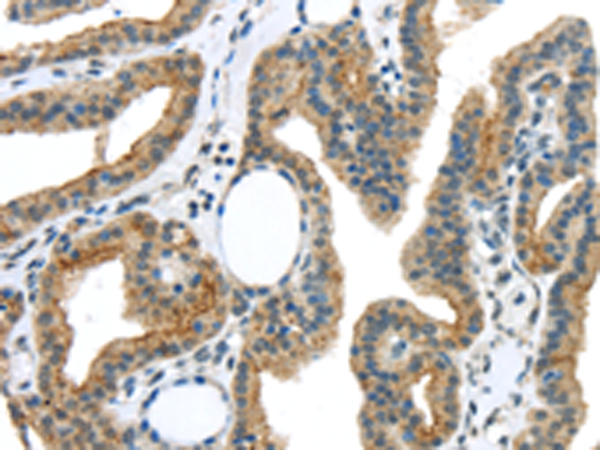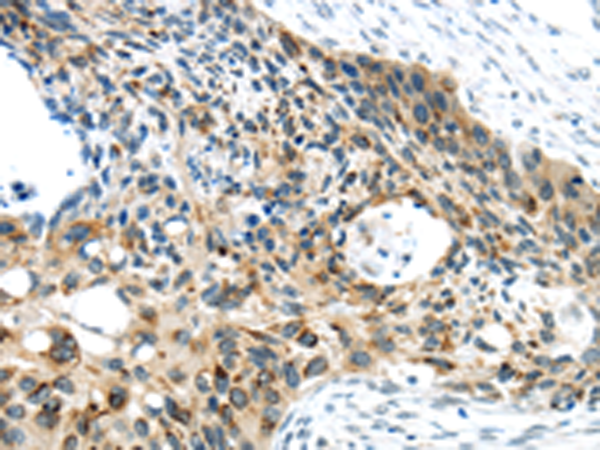


| WB | 咨询技术 | Human,Mouse,Rat |
| IF | 咨询技术 | Human,Mouse,Rat |
| IHC | 1/25-1/100 | Human,Mouse,Rat |
| ICC | 技术咨询 | Human,Mouse,Rat |
| FCM | 咨询技术 | Human,Mouse,Rat |
| Elisa | 1/2000-1/5000 | Human,Mouse,Rat |
| Aliases | SYB2; VAMP-2 |
| WB Predicted band size | 13 kDa |
| Host/Isotype | Rabbit IgG |
| Antibody Type | Primary antibody |
| Storage | Store at 4°C short term. Aliquot and store at -20°C long term. Avoid freeze/thaw cycles. |
| Species Reactivity | Human, Mouse, Rat |
| Immunogen | Synthetic peptide of human VAMP2 |
| Formulation | Purified antibody in PBS with 0.05% sodium azide and 50% glycerol. |
+ +
以下是关于VAMP2抗体的3篇参考文献及其摘要概括:
---
1. **文献名称**: "VAMP2 mediates neurotransmitter release and synaptic plasticity in hippocampal neurons"
**作者**: Schoch S, Deák F, Königstorfer A, et al.
**摘要**: 该研究利用VAMP2特异性抗体验证了VAMP2在突触囊泡释放神经递质中的关键作用,并通过敲除实验证明其缺失导致海马神经元突触可塑性受损,揭示了VAMP2在学习和记忆中的分子机制。
---
2. **文献名称**: "Antibody-based profiling of synaptic vesicle proteins in Alzheimer’s disease"
**作者**: Sokolow S, Henkins KM, Williams IA, et al.
**摘要**: 通过VAMP2抗体对阿尔茨海默病模型小鼠脑组织进行免疫组化分析,发现突触囊泡蛋白VAMP2的表达水平显著降低,提示其与突触功能障碍和认知衰退密切相关。
---
3. **文献名称**: "Characterization of monoclonal antibodies against VAMP2 for neuroendocrine studies"
**作者**: Jahn R, Schiebler W, Ouimet C, et al.
**摘要**: 该文献系统验证了多种VAMP2单克隆抗体的特异性,证实其适用于免疫印迹(Western blot)和免疫电镜,为神经内分泌研究中囊泡融合机制的解析提供了可靠工具。
---
4. **文献名称**: "VAMP2 is required for insulin granule exocytosis in pancreatic β-cells"
**作者**: Ostenson CG, Gaisano HY, Sheu L, et al.
**摘要**: 使用VAMP2抗体进行β细胞免疫荧光和蛋白质印迹分析,发现VAMP2在胰岛素分泌颗粒的胞吐过程中不可或缺,其功能异常可能导致2型糖尿病病理机制。
---
这些文献展示了VAMP2抗体在神经科学、疾病模型及分泌机制研究中的关键应用,涵盖功能验证、疾病关联分析及抗体工具开发等方面。
VAMP2 (Vesicle-associated membrane protein 2), also known as synaptobrevin-2. is a key component of the SNARE (soluble N-ethylmaleimide-sensitive factor attachment protein receptor) complex essential for synaptic vesicle fusion and neurotransmitter release. As a member of the VAMP/synaptobrevin family, it is predominantly expressed in neurons and neuroendocrine cells, where it mediates the docking and fusion of secretory vesicles with the presynaptic membrane during exocytosis. VAMP2 antibodies are widely used tools in neuroscience research to study synaptic transmission, vesicle trafficking, and related pathologies.
These antibodies specifically recognize epitopes within the VAMP2 protein, often targeting its cytoplasmic domain (e.g., amino acids 60-69 or 94-103). Both monoclonal and polyclonal variants are available, typically raised in rabbits, mice, or goats. Applications include Western blotting, immunohistochemistry, immunofluorescence, and immunoprecipitation to investigate VAMP2 expression patterns, localization, and interactions with other SNARE proteins like syntaxin and SNAP-25.
VAMP2 dysregulation has been implicated in neurological disorders (e.g., Alzheimer's disease, Parkinson's disease) and endocrine diseases. Researchers utilize VAMP2 antibodies to explore synaptic plasticity mechanisms, neurotoxin effects (e.g., botulinum toxins that cleave SNARE proteins), and potential therapeutic targets. Validation through knockout controls or peptide blocking experiments is crucial due to homology with other VAMP isoforms.
×